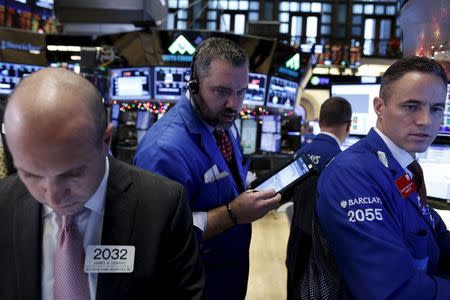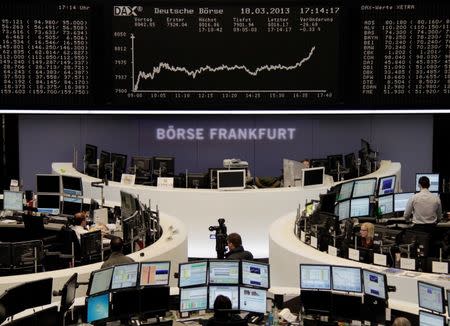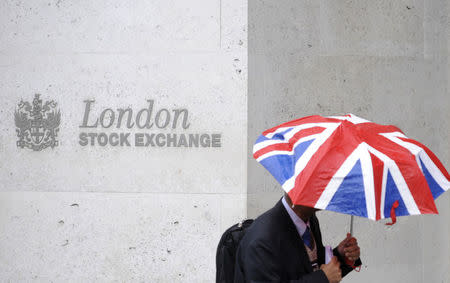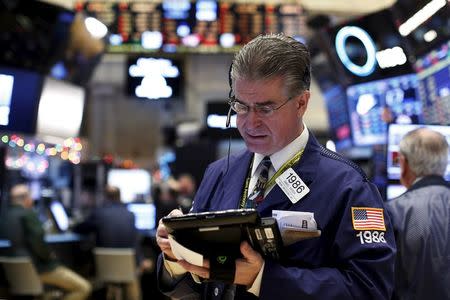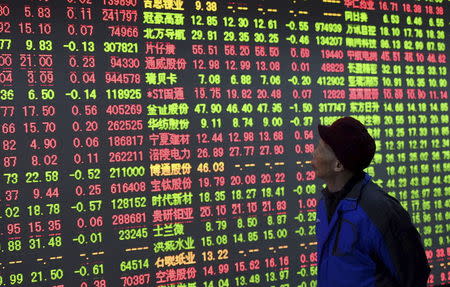Equities rally as oil bounces; Fed decision on deck
By Chuck Mikolajczak NEW YORK (Reuters) - Global equity markets rallied on Tuesday as oil prices bounced from multi-year lows, though investors remained leery about the possibility of increased volatility with a widely-anticipated increase in U.S. interest rates due later this week. Oil reversed early falls to snap a six-day slide as bargain hunters moved in after crude dropped to its lowest level since December 2008 in the prior session. The jump helped boost equities in both the United States and the Europe. The S&P energy index <.SPNY> rallied 2.9 percent as the best performing of the 10 major S&P sectors, its biggest daily percentage gain in a month. Top officials at the Federal Reserve on Tuesday began a two-day policy meeting that is expected to end with the first U.S. interest rate increase since 2006. The rate rise is largely priced in, as traders see more than an 80-percent chance the central bank will lift its targeted rate range to 0.25 percent to 0.50 percent from the current zero to 0.25 percent range, according to CME Group's FedWatch program. "The economy is getting a little bit better and raising rates does not mean the market is going lower, it’s actually a positive sign," said Joseph Benanti, managing director, sales and trading at Rosenblatt Securities in New York. The Dow Jones industrial average <.DJI> rose 156.41 points, or 0.9 percent, to 17,524.91, the S&P 500 <.SPX> gained 21.47 points, or 1.06 percent, to 2,043.41 and the Nasdaq Composite <.IXIC> added 43.13 points, or 0.87 percent, to 4,995.36. MSCI's all-country world index <.MIWD00000PUS> rose 0.9 percent, while the pan-European FTSEurofirst 300 <.FTEU3> index closed up 2.9 percent, its best day since Oct. 5. Brent crude settled up 1.4 percent at $38.45 after falling as low as $36.33 a barrel on Monday, its weakest since December 2008. U.S. crude settled up 2.9 percent at $37.35. Prices have been falling for weeks due to a global glut of oil and, in the northern hemisphere, a mild start to winter. Low oil prices and worries about higher interest rates have unnerved investors through the energy-dominated U.S. high-yield corporate bond markets. Massive amounts of debt sold by energy and mining companies in recent years, much of it in the form of high-yield, or 'junk,' bonds from small shale gas firms, is facing a wave of credit rating downgrades, and defaults are rising. Losses this year, as measured by the iShares iBoxx High Yield Corporate Bond ETF , are more than 10 percent, in what some investors see as an echo of the 2008 credit crisis. The ETF was up 1.6 percent to $80.12 on Tuesday. "This is a dead-cat bounce because where there is smoke there is fire and there is plenty of smoke for sure in that high-yield bond market," said Ken Polcari, Director of the NYSE floor division at O’Neil Securities in New York. Benchmark 10-year Treasury notes lost 13/32 in price to yield 2.2711 percent. The dollar index <.DXY>, which measures the U.S. currency against a basket of its peers, climbed 0.6 percent to 98.199. Data showed inflation pressures rose in the United States in November, further cementing expectations for a hike in interest rates. The euro lost 0.6 percent to $1.0923. (Additional reporting by Marcus Howard; Editing by Nick Zieminski)
